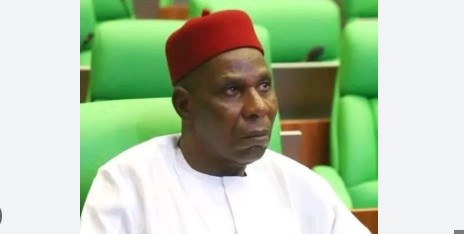A member of the House of Representatives, Chief Emmanuel Uguru, representing the Abakaliki/Izzi Federal Constituency of Ebonyi State, has accused the Central Bank of Nigeria (CBN) of undermining President Bola Ahmed Tinubu’s administration with stringent cashless policies.
Uguru criticized the CBN’s e-payment and cashless systems, labeling them as poorly implemented initiatives that exacerbate the hardship Nigerians are already enduring due to the removal of petroleum subsidies. He made these remarks during an interactive session with journalists in Abakaliki, following his receipt of the chieftaincy title Agbarungele 1 of Izhi Nnodo Clan from the Izzi Development Union (IDU) during its 2024 end-of-year party.
The lawmaker revealed that he is set to present a bill in the National Assembly aimed at mitigating the adverse effects of CBN’s policies.
“I have a bill ready for presentation next week. Go to any bank today; you’ll find that nobody gives cash. When I went to Abuja, I deposited a cheque for N400,000, but the bank told me I could only withdraw N10,000. Meanwhile, POS operators have mint cash readily available. This shows a deliberate failure in the system.”
Uguru argued that while e-payment systems help curb theft and crime, they fail to address the reality of Nigeria’s largely informal economy, where many transactions still rely on cash.
The lawmaker alleged that the CBN is supplying large sums of mint cash to POS operators, sidelining commercial banks.
Read also: “Deltans must sleep with both Eyes closed” – Police Command
“How can the CBN allocate just N200,000 to a commercial bank but allow POS operators to access as much as they want in mint? This system is broken. I personally bought mint cash as proof of this malpractice. It’s clear that some individuals within the CBN are sabotaging the President’s efforts to improve Nigerians’ lives.”
With the festive season approaching, Uguru expressed
concern over how the cashless policy is affecting everyday Nigerians. He questioned the practicality of using e-payment systems in rural areas where digital literacy and infrastructure remain poor.
“How do you expect someone to transfer money to a farmer in the village for pepper or rice during the festive period? This cashless policy doesn’t align with the realities of many Nigerians.”
Uguru called on President Tinubu to urgently address the flaws in the CBN’s policies, cautioning that prolonged inaction could erode public patience.
“Mr. President has done a lot to improve Nigerians’ lives, but his subordinates, particularly in the CBN, are undermining his efforts. These policies need urgent review to prevent further hardship.” He concludes.






